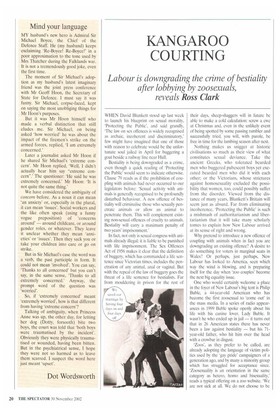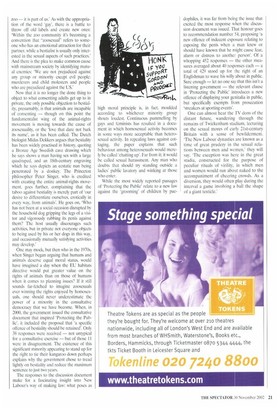KANGAROO COURTING
Labour is downgrading the crime of bestiality after lobbying by zoosexuals,
reveals Ross Clark
WHEN David Blunkett stood up last week to launch his blueprint on sexual morality, 'Protecting the Public', and said grandly, 'The law on sex offences is widely recognised as archaic, incoherent and discriminatory,' few might have imagined that one of those with reason to celebrate would be the unfortunate soul jailed in April for buggering a goat beside a railway line near Hull.
Bestiality is being downgraded as a crime, even though a quick reading of 'Protecting the Public' would seem to indicate otherwise. Clause 79 reads as if the prohibition of coupling with animals had never occurred to our legislators before: 'Sexual activity with animals is generally recognised to be profoundly disturbed behaviour. A new offence of bestiality will criminalise those who sexually penetrate animals or allow an animal to penetrate them. This will complement existing non-sexual offences of cruelty to animals. Bestiality will carry a maximum penalty of two years' imprisonment.'
In fact, not only is sexual congress with animals already illegal; it is liable to be punished with life imprisonment. The Sex Offences Act of 1956 makes it clear that the definition of buggery, which has commanded a life sentence since Victorian times, includes the penetration of any animal, anal or vaginal. But with the repeal of the law of buggery goes the threat of a life sentence for bestialists. Far from mouldering in prison for the rest of their days. sheep-shaggers will in future be able to make a cold calculation: screw a ewe at Christmas and, even in the unlikely event of being spotted by some passing rambler and successfully tried, you will, with parole, be free in time for the lambing season after next.
Nothing makes us snigger at historic civilisations so much as their view of what constitutes sexual deviance. Take the ancient Greeks, who tolerated bearded men who buggered pubescent boys yet executed bearded men who did it with each other; or the Victorians, whose strictures against homosexuality excluded the possibility that women, too, could possibly suffer from the disorder. Viewed from the distance of many years, Blunkett's Britain will seem just as absurd. Far from eliminating incoherence, 'Protecting the Public' is such a mishmash of authoritarianism and libertarianism that it will take many scholarly tomes to explain how New Labour arrived at its sense of right and wrong.
Why pretend to introduce a new offence of coupling with animals when in fact you are downgrading an existing offence? A desire to do something for voters in marginal seats in Wales? Or perhaps, just perhaps, New Labour has looked to America, seen which way the wind is blowing, and is preparing itself for the day when 'zoo couples' become the next big equality issue.
One who would certainly welcome a place in the foyer of New Labour's big tent is Philip Buble, a 44-year-old American who has become the first zoosexual to 'come out' in the mass media. In a series of radio appearances in 1999 Buble spoke openly about his life with his canine lover, Lady Buble. It wasn't he who ended up in jail — it turns out that in 26 American states there has never been a law against bestiality — but his 71year-old father, who hit him over the head with a crowbar in disgust.
'Zoos', as they prefer to be called, are already adopting the language of victim politics used by the 'gay pride' campaigners of a generation ago, and by many a minority group which has struggled for acceptance since. `Zoosexuality is an orientation in the same category as hetero, homo and bisexuality,' reads a typical offering on a zoo website. 'We are not sick at all. We do not choose to be
zoo it is part of us.' As with the appropria
tion of the word 'gay', there is a battle to throw off old labels and create new ones: 'Within the zoo community it's becoming a convention that "zoosexual" refers to someone who has an emotional attraction for their partner, while a bestialist is usually only interested in the sexual aspects of such practices.' And there is the plea to make common cause with mainstream society by identifying mutual enemies: 'We are not prejudiced against any group or minority except evil people: murderers and child molesters and people who are prejudiced against the US.'
Now that it is no longer the done thing to object to what consenting adults get up to in private, the only possible objection to bestiality, presumably, is that animals are incapable of consenting — though on this point the fundamentalist wing of the animal-rights movement is moving towards the cause of zoosexuality, or the 'love that dare not bark its name', as it has been called. The Dutch biologist Midas Dekkers argues that bestiality has been widely practised in history, quoting a Bronze Age Swedish cave drawing which he says shows a man having sex with a large quadruped, and an 18th-century engraving which he says depicts an ecstatic nun being penetrated by a donkey. The Princeton philosopher Peter Singer, who is credited with creating the entire animal-rights movement, goes further, complaining that the taboo against bestiality is merely part of 'our desire to differentiate ourselves, erotically in every way, from animals'. He goes on, 'Who has not been at a social occasion disrupted by the household dog gripping the legs of a visitor and vigorously rubbing its penis against them? The host usually discourages such activities, but in private not everyone objects to being used by his or her dogs in this way, and occasionally mutually satisfying activities may develop.'
One may mock, but then who in the 1970s, when Singer began arguing that humans and animals deserve equal moral status, would have imagined a day when the EU habitats directive would put greater value on the rights of animals than on those of humans when it comes to planning issues? If it still sounds far-fetched to imagine zoosexuals ever winning the rights enjoyed by homosexuals, one should never underestimate the power of a minority in the consultative democracy that we have become. When, in 2000, the government issued the consultative document that inspired 'Protecting the Public', it included the proposal that 'a specific offence of bestiality should be retained'. Only 38 responses were received — not untypical for a consultative exercise — but of those 11 were in disagreement. The existence of this significant minority appearing to stand up for the right to tie their kangaroo down perhaps explains why the government chose to tread lightly on bestiality and reduce the maximum sentence to just two years.
The responses to the discussion document make for a fascinating insight into New Labour's way of making law: what poses as high moral principle is, in fact, moulded according to whichever minority group shouts loudest. Continuous pummelling by gays and feminists has resulted in a document in which homosexual activity becomes in some ways more acceptable than heterosexual activity. In repealing laws against cottaging, the paper explains that such behaviour among heterosexuals would merely be called 'chatting up'. Far from it; it would be called sexual harassment. Any man who doubts that should try standing outside a ladies' public lavatory and winking at those who enter.
While the most widely reported passages of 'Protecting the Public' relate to a new law against the 'grooming' of children by pae
dophiles, it was far from being the issue that excited the most response when the discussion document was issued. That honour goes to recommendation number 54, proposing 'a new offence of indecent exposure relating to exposing the penis when a man knew or should have known that he might cause fear, alarm or distress to another person'. Of a whopping 452 responses — the other measures averaged about 40 responses each — a total of 429 stood up for the right of an Englishman to wave his willy about in public. Sure enough — let no one say that this isn't a listening government — the relevant clause in 'Protecting the Public' introduces a new offence of displaying your genitalia in public, but specifically exempts from prosecution 'streakers at sporting events'.
One can almost hear the TV dons of the distant future, wandering through the remains of Twickenham stadium, lecturing on the sexual mores of early 21st-century Britain with a sense of bewilderment. 'The New Labour dynasties are known as a time of great prudery in the sexual relations between men and women.' they will say. The exception was here in the great stadia, constructed for the purpose of peculiar rituals of virility, in which men and women would run about naked to the accompaniment of cheering crowds. As a diversion, they would often play during the interval a game involving a ball the shape of a giant testicle.'



























































































 Previous page
Previous page